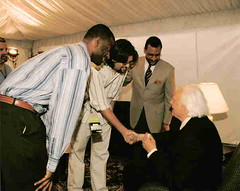Motorcycle Diaries
I finally got around to watching Motorcyle Diaries this weekend, after anticipating it since last summer. On the whole, I was disappointed with the movie, as a movie, because of a pace that d-r-a-g-g-e-d at parts, and the inclusion of too many "roadtrip" cliches. But the point of the film I loved, even though Ernesto "Che" Guevara the man, on whose memoirs the film is based, is a controversial figure to many in our country.

Politicized Che is referenced only briefly in postscripts at the end of the film, which instead focuses on a six-month exploration of Latin America by 23-year-old Che and his friend Alberto Granado. Along the way, they experience the universality of suffering, the capacity of injustice to transcend national borders, and the truth of Christ's words: "The poor will always be with you." The journey changes them, heigtening their sensitivities to the marginalized and dispossessed, and calling them to action. One scene in particular stands out.
During a visit to a leper cololony in Peru's Amazon region, the presiding doctor requested that Che and Alberto wear plastic gloves according to custom. Che confirmed that leprosy was not contagious by touch, then refused to wear the gloves and instead greeted lepers with a gloveless handshake. He was similarly insulted that the colony's medical staff segregated themselved on one side of the river, while the patients lived on the other. His last night in the village, he swam across the river, over the objections of Alberto and the staff, to celebrate his birthday with the lepers.
Che has become an icon whose face adorns t-shirts and coffee mugs and computer screens to the collective dismay of those who despise communism and Fidel Castro's reign of terror. But to attribute Che's enduring legacy to his role as Comandante in Cuba's communist revolt, or as a political agitator elsewhere in Latin America, is to miss the point and oversimplify the person. The icon that is 21st century Che is neither political nor ideological.
Che's legacy endures because he gave his life for the idea that those Christ called "the least of these" have dignity worth fighting to protect and preserve. Christ said loving them means loving Him; serving them means serving Him; touching them, even when their bodies have been disfigured by leprosy, means touching Him. That's a revolution worth dying for. Consider the following, plublished by
Time when it called Che one of the 100 great heroes of the 20th century:
Even though I have come to be wary of dead heroes and the overwhelming burden their martyrdom imposes on the living, I will allow myself a prophecy. Or maybe it is a warning. More than 3 billion human beings on this planet right now live on less than $2 a day. And every day that breaks, 40,000 children — more than one every second! — succumb to diseases linked to chronic hunger. They are there, always there, the terrifying conditions of injustice and inequality that led Che many decades ago to start his journey toward that bullet and that photo awaiting him in Bolivia. (Time 100, Heroes and Icons: Che Guevara, by Ariel Dorfman)
This message and the images inspired by it are timeless.














1 Comments:
I thought the movie was cool. But you're right, it was slow at times.
On Che: I agree with you. A lot of people overlook his commitment to fighting injustice and loving the poor. He's somewhat of a hero in the community here in East L.A. Usually it's young Latinos who are trying to find self worth in the midst of the injustices they see who worship him. It makes for great evangelistic conversations.
Post a Comment
<< Home